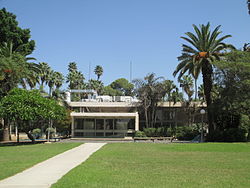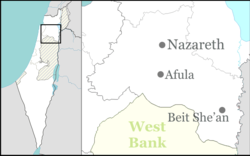Gvat
|
Gvat גבת |
|
|---|---|
| Hebrew transcription(s) | |
| • official | Gevat |
 |
|
| Coordinates: 32°40′30.71″N 35°12′41.75″E / 32.6751972°N 35.2115972°ECoordinates: 32°40′30.71″N 35°12′41.75″E / 32.6751972°N 35.2115972°E | |
| District | Northern |
| Council | Jezreel Valley |
| Affiliation | Kibbutz Movement |
| Founded | 28 November 1926 |
| Founded by | Immigrants from Pinsk |
| Population (2015) | 860 |
| Website | www.gvat.org.il |
Gvat or Gevat (Hebrew: גְּבַת) is a kibbutz in northern Israel near Migdal HaEmek in the Jezreel Valley. It falls under the jurisdiction of Jezreel Valley Regional Council. In 2015 it had a population of 860. Gvat is the founder of Plastro, one of the world's largest drip irrigation systems manufacturers.
The kibbutz was established on 28 November 1926 by a group of Fourth Aliyah pioneers from Pinsk, Poland, on the land of the village of Jibta, which had been sold by the Sursock family and their partners to the Zionists.
In 1922, the first kibbutz members formed a kvutza in memory of the 35 members of the Jewish community of Pinsk killed by the Polish Army on 5 April 1919 during the Pinsk massacre. The kibbutz was named after Givta, a town located near Tzippori during the period of the Second Temple. In 1931 with the help of the Jewish National Fund and donations from Pinsk's Jewish community, a forest commemorating the victims of the Pinsk massacre was planted near Gvat.
The kibbutz was established on classical Zionist-Socialist principles and there has never been a synagogue in the village. Gvat was later joined by adherents of the Poalei Zion movement from Pinsk and its surrounding region, as well as by members of HeHalutz from Poland and Germany.
...
Wikipedia

